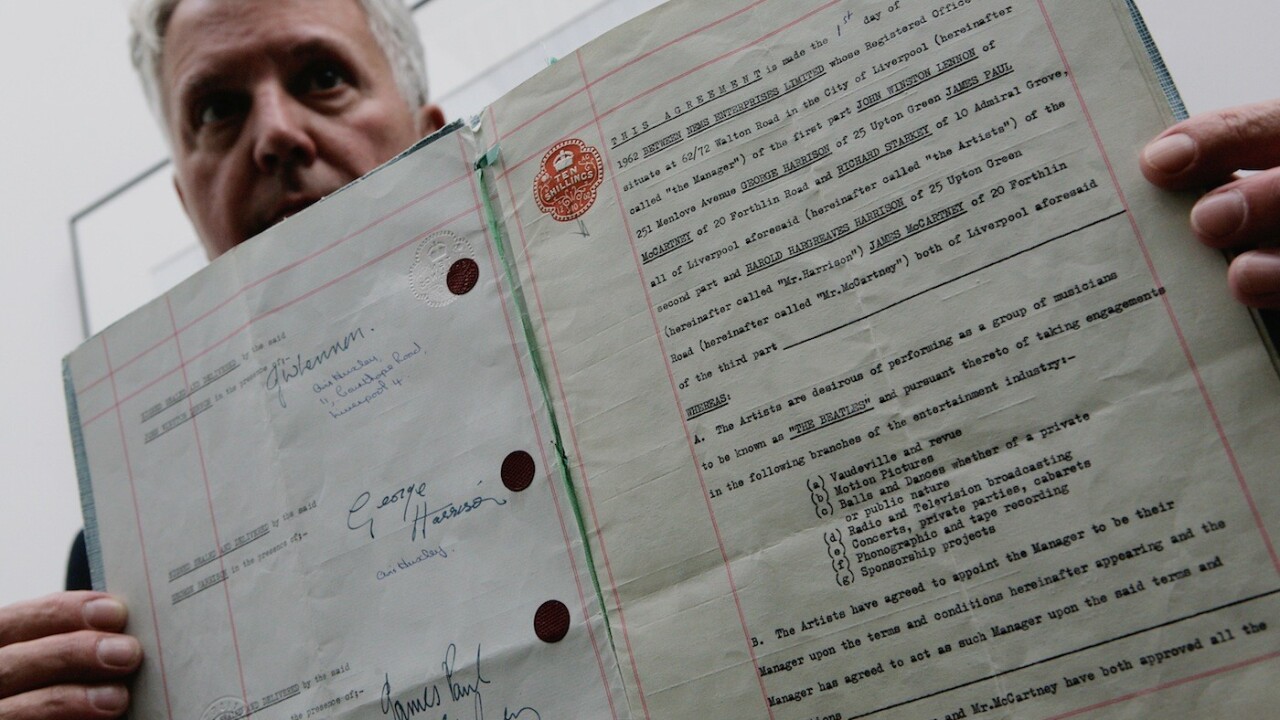
If you are a freelancer, at some point you have been told to get a contract together for your clients. I bet those advisors weren’t as helpful when it came to what clauses you should put in your freelance contract, though! While it is easy to say “get a contract,” it isn’t as easy to say what should go in it.
I have recently been asked by four separate friends of mine who are either thinking about freelancing or are already freelancing about what clauses I have in my contract and which ones they should have in theirs. While I am far from a lawyer, over the last five years of freelancing, I have learned a thing or two about what a solid freelancing contract should have.
While all freelancers should use a contract, how it works in their business and the reasons why they should use a contract vary. The reason to use a contract in your freelancing often boils down to the need to protect yourself, your work, and your business. Some contracts even go as far as protecting the client should things head south. I feel a healthy combination of both is the best objective to not only protect yourself but to also make the client feel more at-ease and comfortable working with you.
So, with all of that said, what are some of the must-haves in your freelance contract? Things from project specs, money, to legal jurisdiction are all the things I will discuss below. I do want to stress again that I am not a lawyer. I strongly recommend once you get your contract together (using the tips below), look for a lawyer who can go over it with you to make sure it will hold should a problem arise. Yes, it is a hefty expense up front, but it will let you sleep better at night, I promise.
Begin your contract with bare-bones starter information
Although other people may name it something different, there is a handful of absolutely required information you must have in any contract. This is what I like to call the starter information.
You should have your client’s name, legal business name (if they are operating under a business), their physical address (if they have office space), their billing address (if not the same as physical), at least one but ideally two different contact numbers, and an email address. You also must add the same information about yourself in the contract as well, so the client knows where they can contact you. If any problem arises and you need it resolved, you and/or a lawyer will need this information to reasonably be able to get in touch with all the parties involved.
Also, a contract isn’t a contract unless it is signed. At the end of your contract, you should have spaces for yourself and your client to sign and date the contract. You may also want to put a place on every page of your contract for your client and your initials as well.
What project details include in the contract
You will hear me say this many times in this article, but being as specific and detailed as possible is best. This is so very true when it comes to outlining the project specifics. Too many times I have heard other freelancers say “well I never stated how many revisions the client gets in the contract.” For this reason and others, it is always best to be very specific in what the client will get for what they are paying for.
You should be extremely specific as to what the client is hiring you for. For example, if you are redesigning a client website, does that also include coding? How about copywriting: are you doing any copywriting for your client or using what is provided to you? What about stock imagery? Will you need to find and purchase stock imagery or will your client be providing their own imagery? How many initial concepts are they going to get? How many changes can they request? If you are charging per project, do you have a “cap hours” spent on the project?
The way I like to think about how specific I have outlined projects is asking myself, “what would someone not involved with this project think they are getting?” The idea here is to leave no holes of information for the client to potentially feel they should be getting something that isn’t stated. For instance, if you don’t state specifically how many revisions they can make and outline what a revision is, then you could leave yourself open to unlimited revisions.
Define how to handle additional work
Along with outlining specifically what you will do (and even possibly what you will not do), you should have some wording relating to what constitutes additional work and how that will be handled. This is often needed to help combat “scope creep,” or the adding of something additional by the client that is not in the project scope. If you outline, in plain terms, what is extra work and how it will be billed should it happen, then it is easier for you to direct your client to your contract when they ask for a little something extra.
Specify responsibilities
I recently added a section in my contract about responsibilities. Geared mostly toward informing my clients what I expected of them, I state things such as “It is your responsibility to help us when it comes to providing information to complete your project” and I go into detail about what that information could be, such as printed content, imagery, etc.
Something else you should consider including is the main person who is responsible for the contract. This should be a name and a title of the person who you will communicate with during the project. Making one person on your client’s end responsible will not only help you if other people in the organization contact you about that project wanting to make changes, but will also make one person accountable should something go wrong.
Fees, taxes, and billing specifics
This is one of the bigger chunks in my contract that I have split up into two distinct sections. I have one section that outlines the project fees and taxes and another one that outlines the billing procedure and how I expect to be paid. How you organize this in your contract is up to you, but let’s discuss some of the absolute musts when it comes to what you should have.
There should be clear and detailed information about what your client will be paying, including any additional fees for things such as website hosting, travel, stock imagery purchases, font purchases, etc. Often, if you have broken up your initial estimate with the client into sections and given each section its own price, you probably will want to stick to that same breakdown in the contract just to make sure everything is crystal clear.
With this you should also talk about the required deposit as well (if you require one – which you should). Hopefully you outlined in your estimate what the deposit amount is going to be, but if you didn’t then you should definitely inform your client what it is, then put it in your contract.
Not only should you outline exactly how much you will be paid, you should also outline exactly when you will get paid. How often will you invoice the client for the project? When are your invoices due? How can your client pay you – by check, PayPal, etc? What happens if your client doesn’t pay you on time – does work stop? Do you charge a late fee? What will you do if they never pay you – will you send it to a collection agency? Make your lawyer send a letter?
In the billing information, I also include information about bounced checks and what will happen if a check a client writes me comes back as nonpayable for any reason. This is often important when freelancers are dealing with large checks or checks that could impact their cash flow significantly.
Copyright assignments and/or permissions
This is an extremely hairy issue, and before determining what clauses you should have in your contract, you should brush up on copyrights and standard practices in the type of freelancing you do. For most freelancers, anything you create you own the rights to, and you give your client rights to use the work in a specific manner.
No matter if the above is true or not, you should outline, in plain English and an easy-to-understand format, what you own and what your client will own when the project is completed. If you own the work, then you should detail how the client can use your work. In addition, defining what “work” means will also help protect you when it comes to unused concepts, sketches, and the like.
In addition to how the copyrights are assigned at the end of the project, you should also include a clause about works that your client provides to you. My contract has the following wording in regards to this, “Any artwork, imagery, text, etc you supply for use in your project must be materials your company created or that you have the appropriate copyright permissions to reproduce. We cannot be held responsible for copyright infringement claims involving materials supplied for use by you.” This will protect you in the event that a client wants to use an image, for instance, that they pulled off the Internet. I also go into further detail by explaining that I can’t search to find out if they have the appropriate rights to use the work.
Like I said, copyrights are hairy because they cover so many different scenarios. Not only do you have to be concerned about how your client will use the work, who owns the work, and what if a client gives you something to use, you should also have something about you using the work for promotional purposes, such as your portfolio. Most freelancers depend on their portfolio to continue to land more projects and stay in business, so there should be something in your contract to help protect that as well. Simply having a clause that allows you to use the work for promotional purposes in different types of media should help you with this objective. You may also want to include information about the use of credit lines for different works, such as credit links in a footer of a website or credit line in a catalogue designed by you. However, credit lines should be discussed with the client and should never be added at the last minute.
Jurisdiction
If you are a freelancer that finds yourself working with clients outside of your local area, you may want to consider adding some wording on which location’s laws apply if something bad happens. This is often called the “governing law” or “venue.” If you work with out-of-state clients, you will more than likely want to have the laws of your state govern the contract simply because when you hire a lawyer to defend you, you will be hiring a local lawyer. Your lawyer may have additional reasons as to why you should have your contract be governed in a certain area.
In my contract, the wording goes as follows, “This agreement shall be governed by and construed in accordance with the laws of Tennessee” (because I am located in Tennessee). It also goes on to outline specifically what county courts will handle any legal issue. For this information, it is often best to discuss with a lawyer what the courts should be, as for me the courts are in two different counties.
Add a cancellation clause for inactive and cancelled projects
Every freelancer has experienced a client who has either stopped responding to phone calls or emails or have just decided they want to stop work on the project. While clients have every right to stop work on a project, you also have every right to do the same.
You should outline the process of how you handle projects that are inactive (including a definition of what you consider “inactive”) and those that are cancelled, including how you handle the client canceling the project and how you handle canceling the project. Some things that should be outlined include the assignment of copyrights, how payments and remaining balances will be handled, and how the project can be reinstated and what is required.
Inactive and cancelled projects vary among freelancers in how they want to handle it, so some consideration as to how you want to handle such situations will dictate your procedure, but no matter what that procedure is, you are in the best situation when you outline in detail what you will do.
Independent status and non-exclusivity
Finally, something that some freelancers tend to overlook is stating their relationship with their client. While we all feel we are independent and can work on any and all projects whenever we want, some clients may feel differently. It’s important to state your status and relationship with your client.
This is often cleared up and can be handled by outlining your status in your contract. For instance, “You are hiring us as an independent professional and it is understood that we/I are not employees of your company and will not expect to receive the same benefits as employees or should not be expected to be held to the same requirements as employees.” Also, stating that the relationship is a non-exclusive one and that you are free to work with other clients at the same time and cannot be limited to working only on your client’s project will protect you and your income as well.
Other contract clauses to consider
Warranties
Depending on the type of work you do in your freelancing, you may want to either outline any warranties you may have for your work (some web developers give a 30 day warranty for their coding), or if you don’t you might want to consider adding a clause saying that there is no written or implied warranties where it comes to you work, and that your work is “as-is.”
Confidentiality clause
I recently added a clause about confidentiality to protect mainly my business practices and my pricing. I also state in my contract that clients can trust that I will not share any of their business secrets or information they may need to share with me in order to complete their work. This is something you may want to consider depending on the type of freelancing you do.
Fine print
Finally, there is a lot of small print that your lawyer may want you to include in your contract, such as a statement about how attorney fees will be handled, assignment of the contract to another person, force majeure rights in the event of a disaster, and a reservation of rights statement giving you rights and protections to anything not mentioned in your contract. Again, these are things that you should consider discussing with a lawyer before adding, but could help protect you in different situations.
One final note
Your contract is part of your business and how you present yourself to clients. Keep this in mind when working on yours. You should be thinking about how your contract sounds (serious, informal but professional, easy to read, etc.) and how it is presented (with your branding). You should also look at every single clause to make sure that if something is in your contract, there is a reason. You should be working to protect yourself but also be professional when it comes to your clients.
What other clauses do you feel are must-haves in freelancing contracts?
Image Credit: Daniel Berehulak/Staff
Get the TNW newsletter
Get the most important tech news in your inbox each week.




